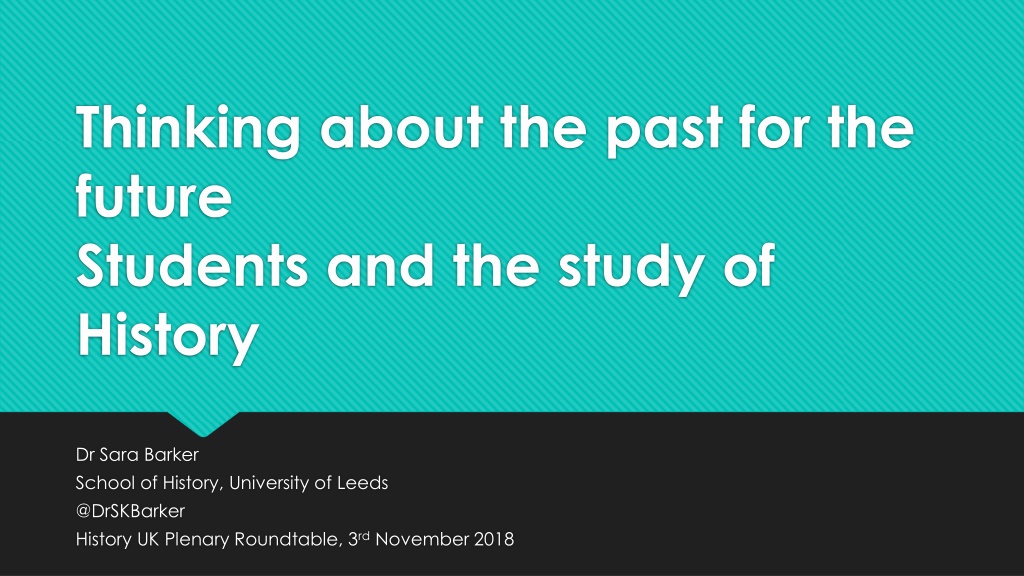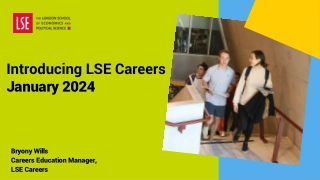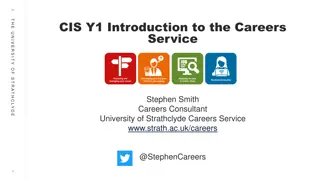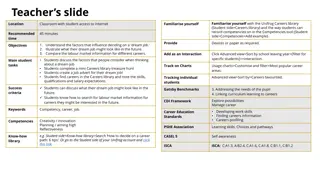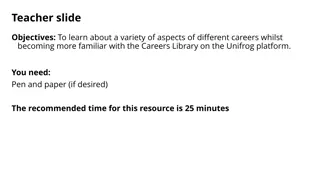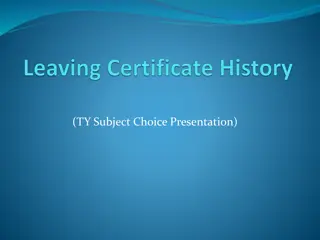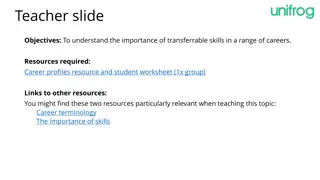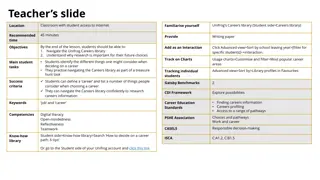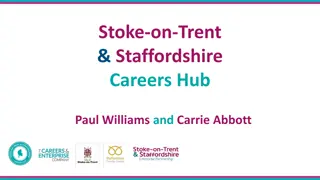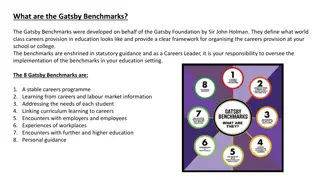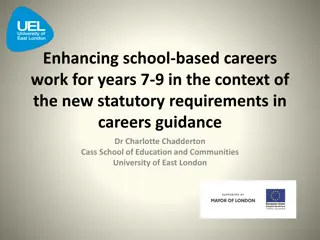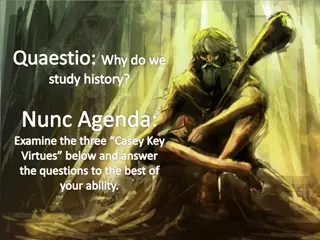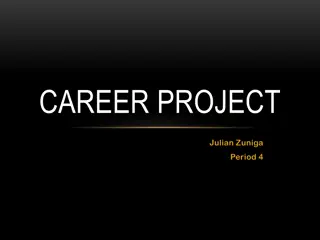Exploring the Significance of Studying History and Its Impact on Future Careers
Delve into the relevance of studying history and how it shapes future career opportunities. Discover insights from renowned history graduates and the valuable transferable skills gained from a history degree. Uncover the essence of history, its applications in modern society, and the importance of learning from the past for a brighter future.
Download Presentation

Please find below an Image/Link to download the presentation.
The content on the website is provided AS IS for your information and personal use only. It may not be sold, licensed, or shared on other websites without obtaining consent from the author. Download presentation by click this link. If you encounter any issues during the download, it is possible that the publisher has removed the file from their server.
E N D
Presentation Transcript
Thinking about the past for the future Students and the study of History Dr Sara Barker School of History, University of Leeds @DrSKBarker History UK Plenary Roundtable, 3rdNovember 2018
Dominic Sandbrook, Daily Mail, 2 November 2018 A history degree gives you no skills that you would not get from a degree in plenty of other subjects. It certainly gives you little that you would not also get from A- level studies, training in all kinds of white-collar jobs, or just reading a book and being a reasonably intelligent adult.
History What does it mean to do History ? What is the use of History ? What is History all about ? WHO publishes today s history ? What do you mean by History ?
How History is presented to prospective students
Reasons to Study History Complete University Guide Transferable Skills History is relevant A History degree is an investment in your future Combined Courses A degree in History encourages independence Studying History provides cultural awareness A History degree allows us to learn from the past Source: https://www.thecompleteuniversityguide.co.uk/courses/history/7-reasons-to-study-history/
Famous History Graduates Times Higher Complete University Guide Louis Theroux Samantha Power Source: https://www.timeshighereduca tion.com/student/subjects/wha t-can-you-do-history-degree Prince Charles Source: https://www.thecompleteuniversityguide. co.uk/courses/history/top-10-celebrities- with-a-history-degree/ Gordon Brown Jonathan Ross Salman Rushdie Elena Kagan Ayn Rand Ellen Barkin Elena Kagan Sacha Baron Cohen Edward Norton Ayn Rand Louis Theroux Steve Carrell Machiavelli, Hume, Hegel, Marx Shakira Salman Rushdie
Famous History Graduates (Guardian 2005) Media Nicky Campbell, Simon Mayo, Jeremy Bowen, Sacha Baron Cohen, Louis Theroux, Jonathan Ross, Melvyn Bragg Politics Gordon Brown, Alan Milburn, John Prescott, David Blunkett, Douglas Hurd, Sir Chris Patten, Kenneth Baker, John McGregor, John Gummer, Douglas Hogg Civil Service Dame Ruth Runciman, of the Advisory Council on the Misuse of Drugs, David Collett, director of VSO, and Martin Gorham, chief executive of the National Blood Service. Law Michael Mansfield QC, Michael Briggs QC Source: https://www.theguardian.com/education/2005/jul/19/highereducation.historyandhistoryofart
Famous History Graduates (Guardian 2005) Museums, Libraries & the Arts Salman Rushdie, Matthew Kneale, Penelope Lively, Anthony Powell, Andrew Morton, Alan Bennett, Howard Barker Security Services John Abbot (director general of the National Criminal Intelligence Service), Roger Brandon (governor of Ford Open prison until 1998) Trade Unions Philip Bowyer, David Davies, John Monk Business & Finance Sir Howard Stringer (Sony), Sir Roland Smith (director of the Bank of England). Gerald Corbett (Railtrack & SSL International - the home of Durex condoms) Source: https://www.theguardian.com/education/2005/jul/19/highereducation.historyandhistoryofart
The Student Room People who study History have an interest in the past, in all sorts of ways; studying the past helps us to understand our present, and to see it in perspective. The study of History is a wonderful training for people to learn how to evaluate evidence and bring it together to form a considered and well-argued judgement. The skills that people acquire when studying for a History degree can be used in all sorts of jobs and are much valued by mainstream employers. A Very Important Point - Not all History courses are the same. Degrees do not have some sort of universal syllabus in the way that A levels do and each University will teach their degree very differently with different optional units and a different focus. History is one of the most popular courses available at University. For this reason, it's essential to do your research and to pitch your applications sensibly.
Surveying UK History Department websites?
Royal historical Society Race, Ethnicity & Equality in UK History Report Historical and Philosophical Studies (H&PS) undergraduate student cohorts are overwhelmingly White , and have lower proportions of BME students (11.3%) than the overall UK undergraduate population (23.9%) BME representation in H&PS departments diminishes further at postgraduate level, with just 8.6% of H&PS postgraduate research students from BME backgrounds, compared to 16.8% of all UK postgraduate research students History academic staff are less diverse than H&PS student cohorts, with 93.7% of History staff drawn from White backgrounds and only 0.5% Black, 2.2% Asian and 1.6% Mixed. Source: https://royalhistsoc.org/racereport/
Key recommendations For Teaching Staff For first year tutors, personal tutors & directors of studies Broaden Coverage throughout the curriculum Articulate the value of a history degree Support the transition from school to university Question the absence of BME historians from reading lists Ensure that induction processes specifically address racial discrimination Address the absences of Black British History Develop a holistic approach to students Diversify content of core methods and theory courses Identify & close the BME attainment gap Facilitate student progression to PG study Raise awareness of BME students to join the next generation of university historians
Cautious optimism Students are really passionate about history They can see the value of a history degree, even if they sometimes need guidance in where to take things further
